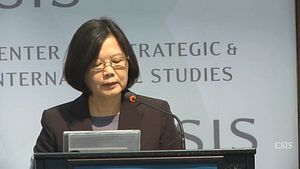Speaking at the Foreign Correspondents’ Club of Japan in Tokyo on Thursday, July 23, former president of the Republic of China (ROC) Lee Teng-hui said that the disputed Diaoyutai islands belong solely to Japan. The Nationalist Party (KMT) unconditionally condemns his statement.
ROC sovereignty over the Diaoyutai is a historical fact supported both by relevant records as well as international agreements. As our foreign minister has explained, envoy mission records and official gazettes published during the Qing Dynasty (1644-1912) include the Daioyutai as part of China, and not as part of the Ryuku Kingdom or Japan.
Japan’s Meiji government repeatedly acknowledged Chinese ownership of the Diaoyutai. The 1943 Cairo Declaration promulgated by World War II allies the ROC, Great Britain and the United States stipulated that “all the territories Japan has stolen from the Chinese, such as Manchuria, Formosa [Taiwan], and the Pescadores [Penghu], shall be restored to the ROC. Japan will also be expelled from all other territories which she has taken by violence and greed.” The World War II Allies’ July 1945 Potsdam Proclamation stated “the terms of the Cairo Declaration shall be carried out.” Japan accepted the Potsdam Proclamation through signing of the Instrument of Surrender in September 1945.
The 1951 San Francisco Peace Treaty between Japan and the western allies stipulated that “Japan has renounced all right, title, and claim to Taiwan (Formosa) and Penghu (the Pescadores)”, and the 1952 Sino-Japanese Peace Treaty between the ROC and Japan nullified the 1895 Treaty of Shimonoseki (Ma-Kuan) under which the Qing Dynasty ceded to Japan Taiwan and islands appertaining to it.
This year commemorates the 70th anniversary of the end of the ROC’s eight-year fight, led by the Kuomintang, against Japanese expansionism, which came at the cost of millions of lives. This sacrifice resulted in Japan’s surrender, the end of the World War II in the Pacific, and the return to the ROC of those territories stolen by Japan. Many in Taiwan find Lee’s ignorance of these facts – and attempt to unilaterally cede the Diaoyutai to Japan – rather peculiar.
Perhaps even more peculiar is that Lee, in his 12 years as ROC president between 1988 and 2000, did not voice his current view. In fact, Lee repeatedly asserted the ROC’s sovereignty over the free area of the ROC, which includes Taiwan, Penghu, Matsu, Kinmen, the Diaoyutai, and the ROC’s territorial claims in the South China Seas.
Despite competing sovereignty claims to the Diaoyutai, on August 5, 2012, President Ma Ying_jeou proposed the East China Sea Peace Initiative. This initiative, welcomed by officials from around the world, proposed that the relevant parties refrain from taking any antagonistic actions, shelve controversies, resolve disputes through peaceful means, and seek consensus with the aim to establish a code of conduct for cooperation in the East China Sea. Although we view sovereignty as indivisible, the initiative proposes that resources in the Diaoyutai be shared. The people of Taiwan await a positive reply to the initiative from mainland China and Japan.
The people of Taiwan also still await a clear rebuke of Lee’s statements from DPP party chairwoman and presidential candidate, Tsai Ing-wen. Tsai served as an aide to Lee during his presidency and subsequently held a series of senior positions in the DPP administration that followed, where she worked alongside the small group of Lee’s current supporters who desire to cede part of our country’s territory.
Troublingly, while Tsai stated earlier this week that the Diaoyutai belong to Taiwan, she has not been willing to condemn Lee for his statements. This is despite Tsai’s claim during her June visit to the United States that she would respect the ROC constitution, which specifies procedures for how to alter the country’s territory.
During this election campaign, Tsai has developed a reputation for silence on the important issues that confront Taiwan. On the issue of our country’s sovereign territory, Tsai should join us in asserting that the ROC’s territory is indivisible, and unconditionally condemn Lee’s willingness to cede to Japan the Diaoyutai, a part of our sovereign territory.
Eric Huang is the head of the Kuomintang’s Foreign Affairs and Foreign Media sections.
































